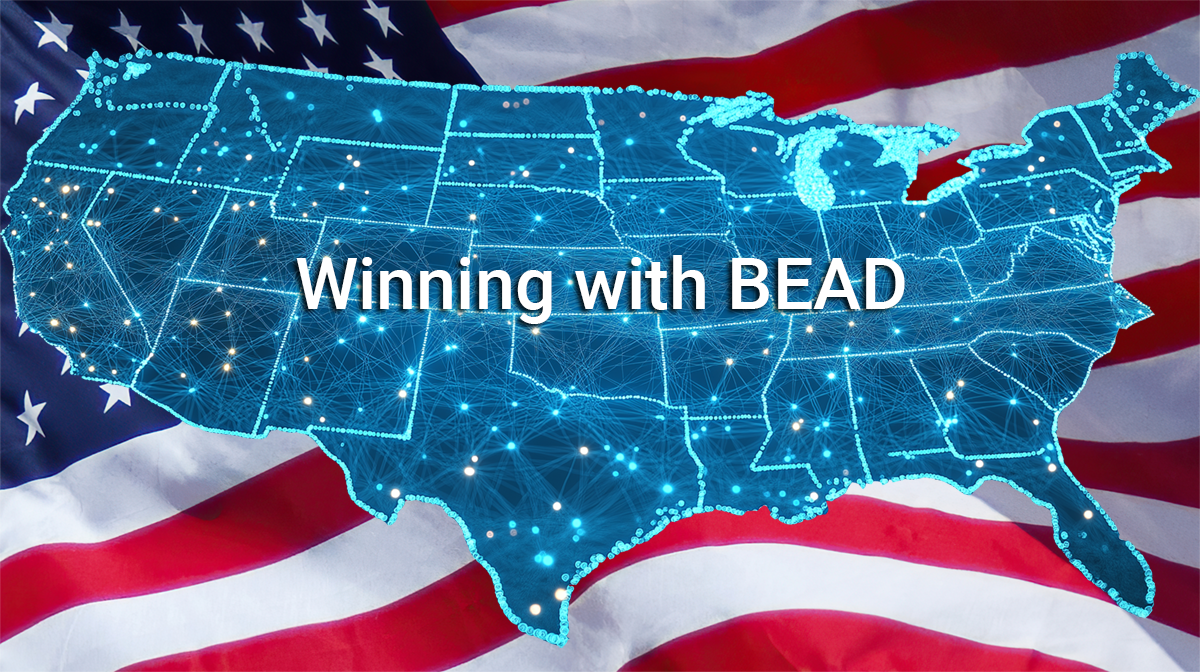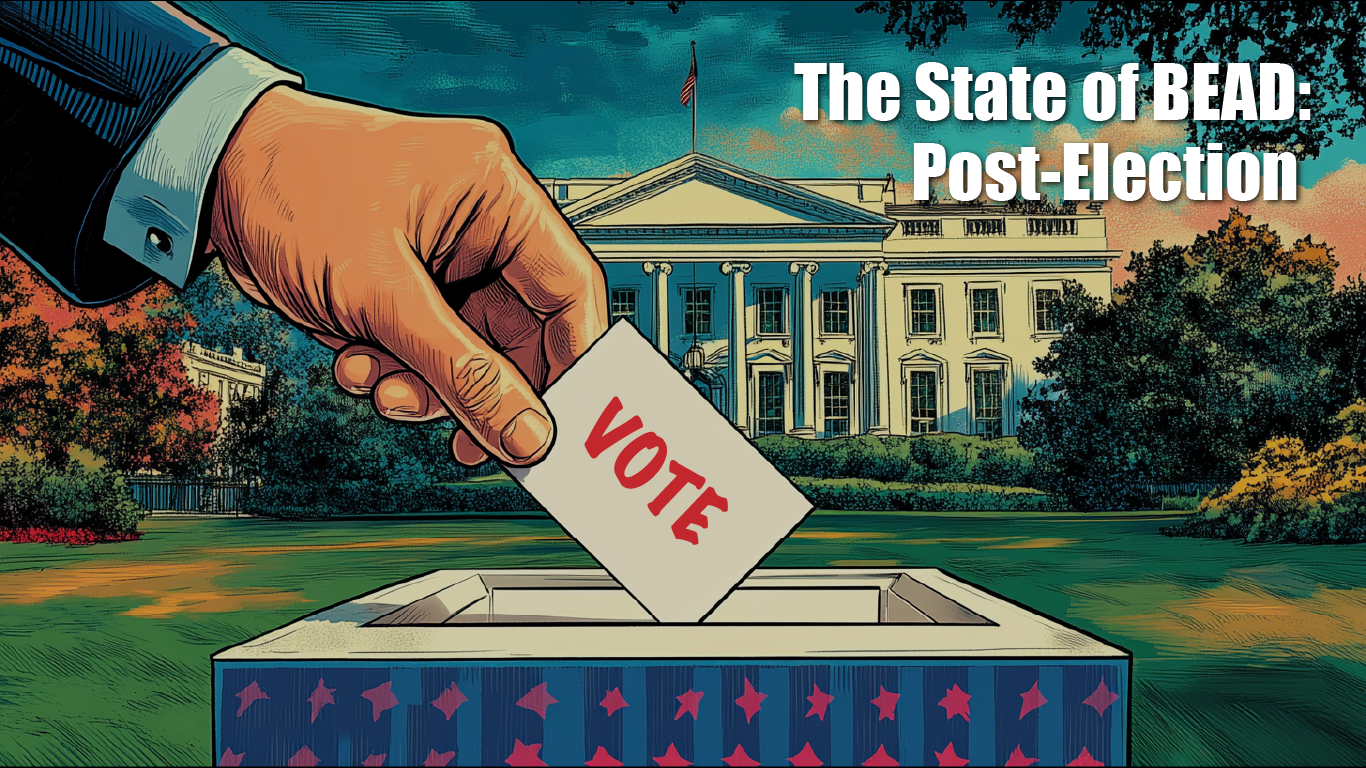Winning with BEAD: Insights from KGPCo & Nokia on Broadband Expansion
March 24, 2025
The BEAD (Broadband Equity, Access, and Deployment) program is caught in a unique moment—both accelerating forward and hitting the brakes at the same time. States are rapidly moving through the grant process, awarding funds and pushing broadband expansion projects ahead. Yet, at the federal level, the Commerce Department is reevaluating key program rules, potentially shifting billions in funding and reshaping how BEAD dollars will be spent. This contradiction leaves broadband providers in a tricky position: move too fast, and they risk running into regulatory changes; wait too long, and they might miss crucial funding opportunities.
That’s exactly why KGPCo’s Ashley Travers and Nokia’s Lori Adams recently hosted the webinar, Winning with BEAD: Best Practices from Early States & How to Prepare for Success. Together, they tackled the biggest questions surrounding BEAD, from state-level progress to Buy America compliance—giving providers the knowledge they need to move forward with confidence.
And the key takeaway? BEAD is happening—fast. The time to act is now.
BEAD is Moving Forward—Despite Federal Leadership Changes
One of the biggest concerns raised in the webinar was whether leadership changes at the Department of Commerce and NTIA might impact BEAD funding. With Howard Lutnick expected to take over as Secretary of Commerce and Arielle Roth nominated to lead NTIA, there’s potential for some policy adjustments.
But here’s the good news: funding is still flowing, and states are moving ahead with grant awards. As Lori Adams (Nokia) pointed out:
"For folks who've been thinking BEAD is in the future—BEAD is happening and happening fast."
Every state has now secured approval for its Volume 2 plans and is progressing through the grant application and award process. Ashley Travers (KGPCo) emphasized the urgency:
"State broadband offices are making decisions now. If ISPs and municipalities don’t engage early, they risk falling behind."
This means that broadband providers shouldn’t wait for potential NTIA shifts to finalize their BEAD plans. KGPCo is actively tracking these changes and helping providers move forward based on the most up-to-date regulations—so they don’t get caught in unnecessary delays.
Starlink & Satellite Internet Gain Ground in BEAD Funding
A major shake-up to BEAD came with Commerce Secretary Howard Lutnick’s plan to make BEAD technology neutral. Previously, BEAD funding was primarily directed toward fiber-optic infrastructure, with satellite solutions considered only in areas where fiber deployment wasn’t feasible.
However, under the proposed policy changes, satellite internet providers—particularly Starlink—stand to receive a much larger share of BEAD funds. Initially, Starlink was expected to qualify for about $4.1 billion in funding, but under the new approach, it could receive between $10 billion and $20 billion.
While fiber providers remain a priority, these changes mean states will have more flexibility in awarding funds to alternative broadband solutions. This shift could result in a reevaluation of some state-level BEAD plans, potentially delaying their implementation.
State-Level BEAD Progress: Where Things Stand
Despite these adjustments, BEAD funding is still advancing rapidly. Some states, like Missouri, Colorado, and Arkansas, are already in the final stages of evaluating applications and preparing to distribute funds. Others, like Virginia and Illinois, are still working through mapping and challenge processes but aren’t far behind.
Even in Georgia—where funding evaluations were briefly paused—officials have made it clear that fiber-first broadband expansion remains a priority.
For ISPs and municipalities, this means that proactive engagement is crucial. Waiting too long could limit funding opportunities or delay project timelines.
That’s why KGPCo is working closely with broadband providers to help them:
- Understand state-specific funding processes and how to qualify for grants.
- Submit strong applications that meet all compliance and documentation requirements.
- Stay ahead of shifting state deadlines to avoid missing out on funding rounds.
Tariffs & Buy America: The Biggest Compliance Challenge
Another pressing issue is the potential impact of new tariffs and Buy America (BABA) requirements. The federal government is considering new tariffs—up to 25%—on broadband-related imports, which could increase costs for:
- Fiber optic cables and components
- Network enclosures, telecom cabinets, and broadband electronics
- Semiconductors and key networking hardware
If implemented, these tariffs could drive up costs and cause major supply chain delays for BEAD-funded projects.
Beyond tariffs, Buy America compliance remains a significant challenge. The rule requires that at least 55% of all materials used in BEAD projects be sourced domestically. But as Lori Adams noted:
"Many broadband components simply aren’t produced in large enough quantities in the U.S. yet."
This means that some BEAD-funded projects will require waivers to purchase essential telecom equipment—and that’s where KGPCo comes in.
Ashley Travers reassured attendees:
"As a distributor, it’s on us to ensure customers have access to Buy America-compliant products when required. It’s all about getting the right materials for the right projects, so work can progress without delays."
KGPCo is actively working with top manufacturers like Nokia to identify:
- U.S.-manufactured products that meet Buy America standards
- Equipment that qualifies for waivers to prevent supply chain delays
- Alternative sourcing strategies to help broadband providers meet funding requirements
With Buy America compliance still evolving, staying informed is essential. KGPCo is tracking these updates daily and helping providers avoid the pitfalls of non-compliant purchases—so they don’t run into costly project delays down the road.
The Bottom Line: BEAD is Moving—Are You Ready?
While the latest changes introduce both opportunities and challenges, one thing is certain: BEAD is moving forward, and broadband providers need to act now.
From understanding state-specific funding shifts to navigating new compliance hurdles, KGPCo is here to help.
Want to ensure your BEAD project stays on track? Contact KGPCo today to learn how we can support your broadband expansion efforts and keep you ahead of the curve.
Stay Ahead—Join Our Next Webinar!
This webinar is just one example of how KGPCo is helping broadband providers navigate the ever-changing landscape of BEAD and BABA. We regularly host exclusive webinars featuring industry experts, policy insights, and actionable strategies to help you stay informed and competitive.
Don’t miss out! Sign up for our next webinar and stay ahead of the curve.
Register Now
Ready to Move Forward? Let’s Talk.
Are you ready to secure your share of BEAD funding and expand your broadband network the right way? KGPCo is here to help.
[[email protected]] | [www.kgpco.com] | [+1 (800) 328-5142]
Let’s build the future of connectivity—together.





